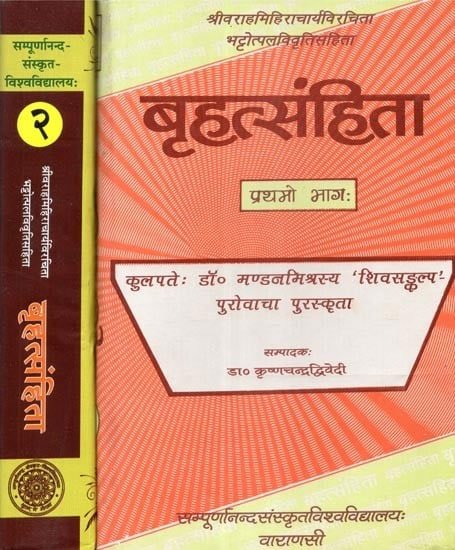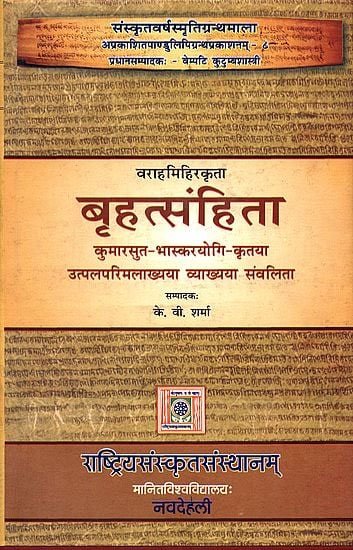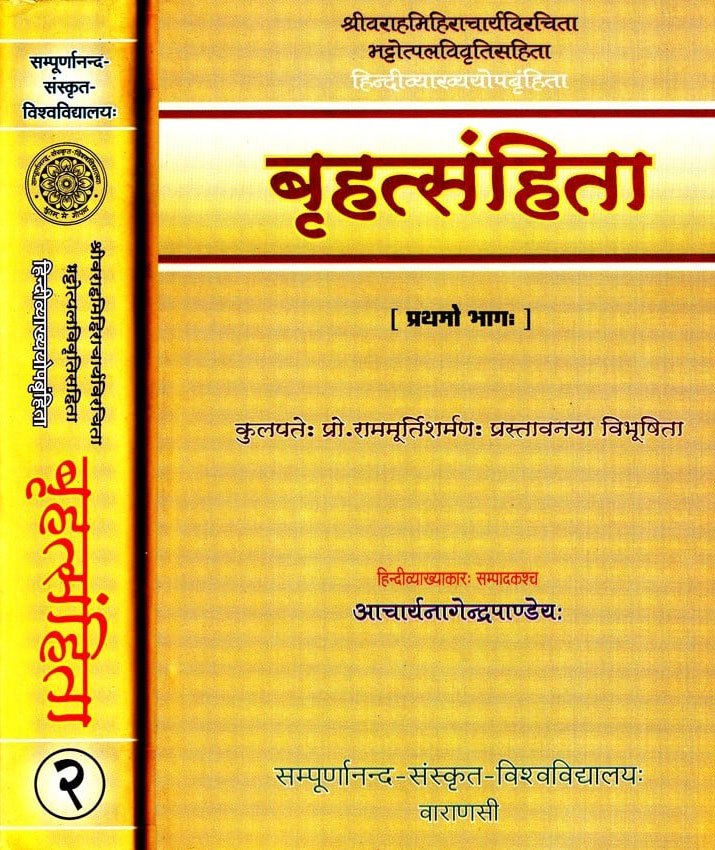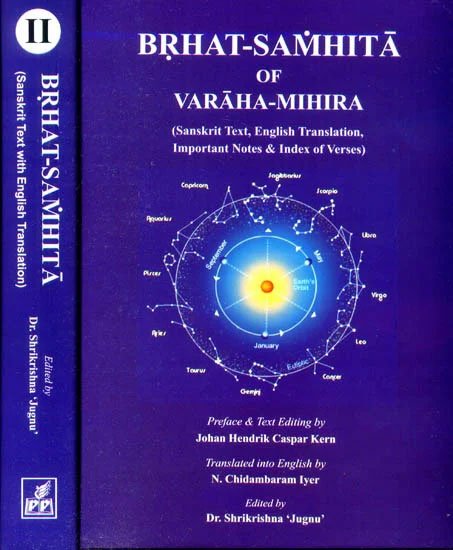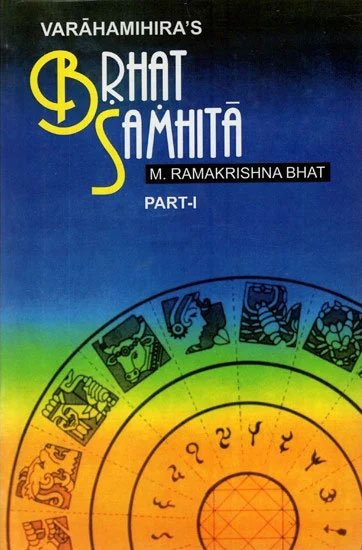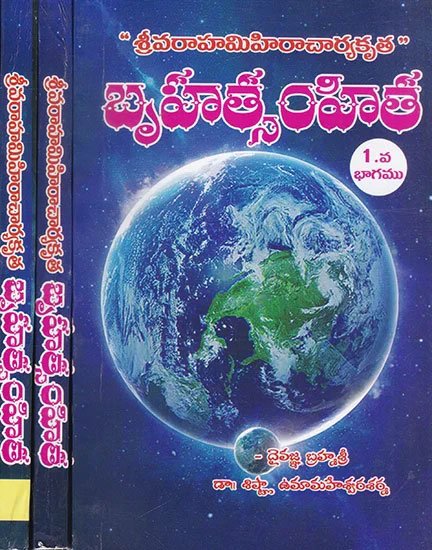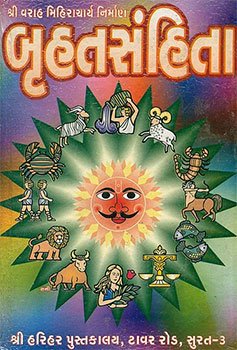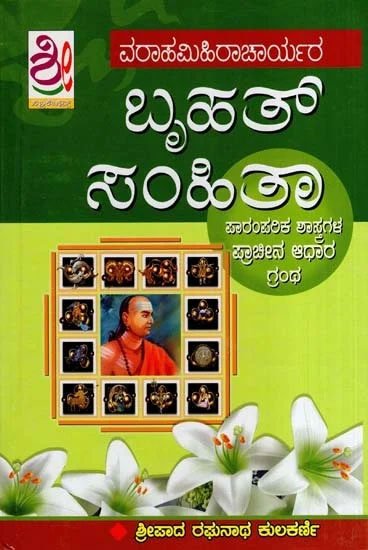Brihat-samhita [sanskrit]
26,560 words
The Sanskrit text of the Brihat-samhita from the 6th-century authored by Varaha Mihira in present-day Ujjain, India. It primarily deals with astrology and astronomy but is presented as an encyclopedia of knowledge.
Verse 27.4
तालीपत्रलतावितानतरुभिः शाखामृगान्नर्तयन्योगेऽस्मिन्प्लवति ध्वनिः सपरुषो वायुर्यदा दक्षिणः ।
तद्वद् योगसमुत्थितस्तु गजवत्तालाङ्कुशैर्घट्टिताः कीनाशा इव मन्दवारिकणिका मुञ्चन्ति मेघास्तदा ॥ ४ ॥
[ध्वनन्सुपरुषो । सर्वोद्योगसमुन्नताश्च । कणिकान्]
tālīpatralatāvitānatarubhiḥ śākhāmṛgānnartayanyoge'sminplavati dhvaniḥ saparuṣo vāyuryadā dakṣiṇaḥ |
tadvad yogasamutthitastu gajavattālāṅkuśairghaṭṭitāḥ kīnāśā iva mandavārikaṇikā muñcanti meghāstadā || 4 ||
[dhvanansuparuṣo | sarvodyogasamunnatāśca | kaṇikān]
The Sanskrit text of Verse 27.4 is contained in the book Brihata Samhita (Sanskrit Text with Hindi Translation) by Pandit Achyutananda Jha. This book is available online or you could buy the latest edition:
Read online Buy now! The Sanskrit text by Pandit Achyutananda Jha (2001)
Glossary of Sanskrit terms
Note: This extracts Sanskrit terms and links to English definitions from the glossary, based on an experimental segmentation of verse (27.4). Some terms could be superfluous while some might not be mentioned. Click on the word to show English definitions.
Tali, Talin, Patra, Latavitana, Taru, Shakhamriga, Rita, Yat, Yoga, Idam, Plavat, Dhvani, Sapa, Rush, Vayu, Yada, Yad, Dakshina, Tadvat, Samutthita, Gajavat, Tala, Ankusha, Ghattita, Kinasha, Iva, Manda, Var, Vari, Kanika, Muncat, Muncanti, Megha, Saru, Sarva, Udyoga, Samunnata,
Analysis of Sanskrit grammar
Note: this is an experimental feature and only shows the first possible analysis of the Sanskrit text (Verse 27.4). If the system was successful in segmenting the sentence, you will see of which words it is made up of, generally consisting of Nouns, Pronouns, Verbs, Participles and Indeclinables. Click on the link to show all possible derivations of the word.
- Line 1: “tālīpatralatāvitānatarubhiḥ śākhāmṛgānnartayanyoge'sminplavati dhvaniḥ saparuṣo vāyuryadā dakṣiṇaḥ ”
- tālī -
-
tālī (noun, feminine)[compound], [nominative single]tāli (noun, feminine)[nominative dual], [vocative dual], [accusative dual]tālin (noun, masculine)[nominative single]
- patra -
-
patra (noun, masculine)[compound], [vocative single]patra (noun, neuter)[compound], [vocative single]
- latāvitāna -
-
latāvitāna (noun, masculine)[compound], [vocative single]
- tarubhiḥ -
-
taru (noun, masculine)[instrumental plural]taru (noun, neuter)[instrumental plural]taru (noun, feminine)[instrumental plural]
- śākhāmṛgānn -
-
śākhāmṛga (noun, masculine)[accusative plural]
- ar -
-
a (noun, masculine)[compound], [vocative single]ā (noun, feminine)[nominative single]ṛ (noun, feminine)[nominative single]ṛ (noun, masculine)[nominative single]
- ṛta -
-
ṛta (indeclinable adverb)[indeclinable adverb]ṛta (noun, masculine)[compound], [vocative single]ṛta (noun, neuter)[compound], [vocative single]
- yan -
-
yat (noun, masculine)[vocative single]√i -> yat (participle, masculine)[nominative single from √i class 2 verb], [vocative single from √i class 2 verb]
- yoge' -
-
yoga (noun, masculine)[locative single]yogā (noun, feminine)[nominative dual], [vocative single], [vocative dual], [accusative dual]
- asmin -
-
idam (pronoun, masculine)[locative single]idam (pronoun, neuter)[locative single]
- plavati -
-
√plav -> plavat (participle, masculine)[locative single from √plav class 1 verb]√plav -> plavat (participle, neuter)[locative single from √plav class 1 verb]√plav (verb class 1)[present active third single]
- dhvaniḥ -
-
dhvani (noun, masculine)[nominative single]
- sapa -
-
sapa (noun, masculine)[compound], [vocative single]√sap (verb class 1)[imperative active second single]
- ruṣo* -
-
ruṣ (noun, feminine)[nominative plural], [vocative plural], [accusative plural], [ablative single], [genitive single]
- vāyur -
-
vāyu (noun, masculine)[nominative single]vāyu (noun, feminine)[nominative single]√vā (verb class 2)[optative active third plural]
- yadā -
-
yadā (indeclinable adverb)[indeclinable adverb]yadā (indeclinable relative)[indeclinable relative]yadā (indeclinable)[indeclinable]yad (noun, masculine)[instrumental single]
- dakṣiṇaḥ -
-
dakṣiṇa (noun, masculine)[nominative single]
- Line 2: “tadvad yogasamutthitastu gajavattālāṅkuśairghaṭṭitāḥ kīnāśā iva mandavārikaṇikā muñcanti meghāstadā || 4 |”
- tadvad -
-
tadvat (noun, masculine)[compound]tadvat (noun, neuter)[nominative single], [vocative single], [accusative single]
- yoga -
-
yoga (noun, masculine)[compound], [vocative single]
- samutthitas -
-
samutthita (noun, masculine)[nominative single]
- tu -
-
tu (indeclinable particle)[indeclinable particle]
- gajavat -
-
gajavat (noun, masculine)[compound]gajavat (noun, neuter)[nominative single], [vocative single], [accusative single]
- tālā -
-
tāla (noun, masculine)[compound], [vocative single]tāla (noun, neuter)[compound], [vocative single]tālā (noun, feminine)[nominative single]
- aṅkuśair -
-
aṅkuśa (noun, masculine)[instrumental plural]aṅkuśa (noun, neuter)[instrumental plural]
- ghaṭṭitāḥ -
-
ghaṭṭita (noun, masculine)[nominative plural], [vocative plural]ghaṭṭitā (noun, feminine)[nominative plural], [vocative plural], [accusative plural]√ghaṭṭ -> ghaṭṭita (participle, masculine)[nominative plural from √ghaṭṭ class 1 verb], [vocative plural from √ghaṭṭ class 1 verb], [nominative plural from √ghaṭṭ class 10 verb], [vocative plural from √ghaṭṭ class 10 verb]√ghaṭṭ -> ghaṭṭitā (participle, feminine)[nominative plural from √ghaṭṭ class 1 verb], [vocative plural from √ghaṭṭ class 1 verb], [accusative plural from √ghaṭṭ class 1 verb], [nominative plural from √ghaṭṭ class 10 verb], [vocative plural from √ghaṭṭ class 10 verb], [accusative plural from √ghaṭṭ class 10 verb]
- kīnāśā* -
-
kīnāśa (noun, masculine)[nominative plural], [vocative plural]kīnāśā (noun, feminine)[nominative plural], [vocative plural], [accusative plural]
- iva -
-
iva (indeclinable adverb)[indeclinable adverb]iva (indeclinable)[indeclinable]
- manda -
-
manda (noun, masculine)[compound], [vocative single]manda (noun, neuter)[compound], [vocative single]
- vāri -
-
vāri (noun, feminine)[compound], [adverb]vāri (noun, neuter)[compound], [adverb], [nominative single], [vocative single], [accusative single]vārī (noun, feminine)[adverb], [vocative single]vār (noun, masculine)[locative single]vār (noun, neuter)[locative single]
- kaṇikā* -
-
kaṇika (noun, masculine)[nominative plural], [vocative plural]kaṇikā (noun, feminine)[nominative plural], [vocative plural], [accusative plural]
- muñcanti -
-
√muc -> muñcat (participle, neuter)[nominative plural from √muc class 6 verb], [vocative plural from √muc class 6 verb], [accusative plural from √muc class 6 verb]√muc -> muñcantī (participle, feminine)[vocative single from √muc class 6 verb]√muñc -> muñcat (participle, neuter)[nominative plural from √muñc class 1 verb], [vocative plural from √muñc class 1 verb], [accusative plural from √muñc class 1 verb]√muñc -> muñcantī (participle, feminine)[vocative single from √muñc class 1 verb]√muc (verb class 6)[present active third plural]√muñc (verb class 1)[present active third plural]
- meghās -
-
megha (noun, masculine)[nominative plural], [vocative plural]meghā (noun, feminine)[nominative plural], [vocative plural], [accusative plural]
- tadā* -
-
- Cannot analyse 4
- Line 3: “[dhvanansuparuṣo | sarvodyogasamunnatāśca ”
- Cannot analyse dhvanansuparuṣo*sa
- sarvo -
-
sarva (noun, neuter)[compound], [vocative single]saru (noun, feminine)[instrumental single]sarva (noun, masculine)[vocative single]sarvā (noun, feminine)[nominative single]
- udyoga -
-
udyoga (noun, masculine)[compound], [vocative single]
- samunnatāś -
-
samunnata (noun, masculine)[nominative plural], [vocative plural]samunnatā (noun, feminine)[nominative plural], [vocative plural], [accusative plural]
- ca -
-
ca (indeclinable conjunction)[indeclinable conjunction]ca (noun, masculine)[compound], [vocative single]ca (noun, neuter)[compound], [vocative single]
Other editions:
Also see the following editions of the Sanskrit text or (alternative) English translations of the Verse 27.4
Brhatsamhita with the Commentary of Bhattotpala
by Krishna Chandra Dwivedi (2016)
Publisher: Sampurnanand Sanskrit University; 1229 pages;
Buy now!
Brihat Samhita with the Commentary of Utpalapatimala of Yogisvara
by K. V. Sharma (2012)
Publisher: Rashtriya Sanskrit Sansthan, Janakpuri; 754 pages; ISBN-10; 8186111360; ISBN-13: 9788186111369
Buy now!
Brihat Samhita (Hindi Translation)
by K. V. Sharma (2002)
Publisher: Sampurnanand Sanskrit University; 2359 pages; ISBN-13: 9789387890008.
Buy now!
Brhat Samhita (English translation)
by N. Chidambaram Iyer (2022)
Publisher: Parimal Publication Pvt. Ltd.; 801 pages; Edited by Dr. Shrikrishna Jugnu; ISBN-10: 8171104215; ISBN-13: 9788171104215.
Buy now!
Brhat Samhita (English with notes)
by M. Ramakrishna Bhat (2010)
Publisher: Motilal Banarsidas Publishers Pvt. Ltd.; 1155 pages; ISBN-10: 8120810600; ISBN-13: 9788120810600.
Buy now!
Brhat Samhita (Telugu translation)
by Sishtla Umamaheswara Sharma (2020)
Publisher: Mohan Publications, Andhra Pradesh; 846 pages.
Buy now!Preview of verse 27.4 in Kannada sript:
ತಾಲೀಪತ್ರಲತಾವಿತಾನತರುಭಿಃ ಶಾಖಾಮೃಗಾನ್ನರ್ತಯನ್ಯೋಗೇಽಸ್ಮಿನ್ಪ್ಲವತಿ ಧ್ವನಿಃ ಸಪರುಷೋ ವಾಯುರ್ಯದಾ ದಕ್ಷಿಣಃ ।
ತದ್ವದ್ ಯೋಗಸಮುತ್ಥಿತಸ್ತು ಗಜವತ್ತಾಲಾಙ್ಕುಶೈರ್ಘಟ್ಟಿತಾಃ ಕೀನಾಶಾ ಇವ ಮನ್ದವಾರಿಕಣಿಕಾ ಮುಞ್ಚನ್ತಿ ಮೇಘಾಸ್ತದಾ ॥ ೪ ॥
[ಧ್ವನನ್ಸುಪರುಷೋ । ಸರ್ವೋದ್ಯೋಗಸಮುನ್ನತಾಶ್ಚ । ಕಣಿಕಾನ್]
Brhat Samhita (Gujarati translation)
by - (2000)
Publisher: Shree Harihar Pustakalay, Surat; Author: Shri Varahamihira Acharya (શ્રી વરાહમિહીરાચાર્ય); 432 pages.
Buy now!Preview of verse 27.4 in Gujarati sript:
તાલીપત્રલતાવિતાનતરુભિઃ શાખામૃગાન્નર્તયન્યોગેઽસ્મિન્પ્લવતિ ધ્વનિઃ સપરુષો વાયુર્યદા દક્ષિણઃ ।
તદ્વદ્ યોગસમુત્થિતસ્તુ ગજવત્તાલાઙ્કુશૈર્ઘટ્ટિતાઃ કીનાશા ઇવ મન્દવારિકણિકા મુઞ્ચન્તિ મેઘાસ્તદા ॥ ૪ ॥
[ધ્વનન્સુપરુષો । સર્વોદ્યોગસમુન્નતાશ્ચ । કણિકાન્]
Brhat Samhita (Kannada translation)
by Sripada Raghunatha Kulkarni (2021)
Publisher: Srinidhi Publications, Bangalore; 668 pages with illustrations.
Buy now!Preview of verse 27.4 in Kannada sript:
ತಾಲೀಪತ್ರಲತಾವಿತಾನತರುಭಿಃ ಶಾಖಾಮೃಗಾನ್ನರ್ತಯನ್ಯೋಗೇಽಸ್ಮಿನ್ಪ್ಲವತಿ ಧ್ವನಿಃ ಸಪರುಷೋ ವಾಯುರ್ಯದಾ ದಕ್ಷಿಣಃ ।
ತದ್ವದ್ ಯೋಗಸಮುತ್ಥಿತಸ್ತು ಗಜವತ್ತಾಲಾಙ್ಕುಶೈರ್ಘಟ್ಟಿತಾಃ ಕೀನಾಶಾ ಇವ ಮನ್ದವಾರಿಕಣಿಕಾ ಮುಞ್ಚನ್ತಿ ಮೇಘಾಸ್ತದಾ ॥ ೪ ॥
[ಧ್ವನನ್ಸುಪರುಷೋ । ಸರ್ವೋದ್ಯೋಗಸಮುನ್ನತಾಶ್ಚ । ಕಣಿಕಾನ್]
![Brihat-samhita [sanskrit] - book cover](/uploads/a/Brihat-Samhita-Sanskrit.jpg)
